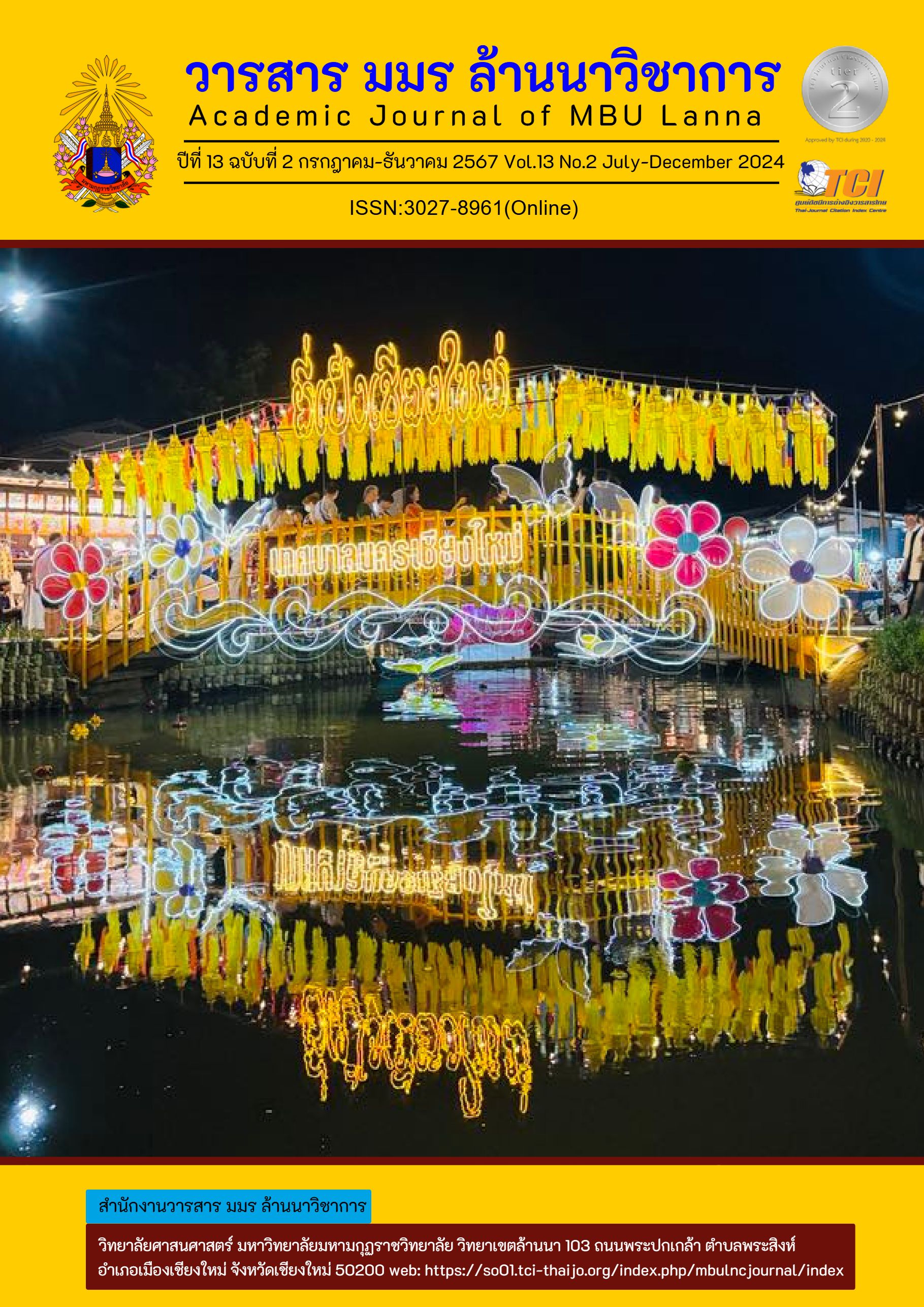An Analysis Mental and Intellectual Empowerment Accordance to the Meditation Style of Somdajphrayanawachirodom (Wiriyang Sirindharo) of Will Power Institute at Jatawana Temple, Muang District, Lampang Province
Keywords:
Mental and intellectual enhancement, Will power institute, Meditation teacher's curriculumAbstract
The objectives of this research were to: 1) to study the methods of teaching 2) to study the application method in everyday life of teaching 3) an analysis of mental and intellectual enhancement of meditation teacher's curriculum of Somdejphrayanawachirodom (Wiriyang Sirindharo) at Jatawana temple, Muang district, Lampang province. This is a qualitative study, with documentary study and in-depth interviews with 15 key informants. Data was analyzed by descriptive content.
The results of this research found that:
- The teacher meditation course is designed to promote Dhamma education and Dhamma practice. There are six courses, namely 1) Ājāriyasa Samadhi (Intense Concentration) course 2) Chinnasa Samadhi course (Samadhi concentration) 3) Vidantasā Samadhi course (Splendid self-Training meditation) 4) Nirasa Samadhi meditation course (Meditation to cut anxiety) 5) Yuwasā Samadhi course (Meditation for youth) 6) Atthasa Meditation course (Meditation for maximum benefits).
- The application of the meditation teacher curriculum in everyday life was based on three virtues, such as: 1) being kind to one another 2) being highly responsible 3) being reasonable. There are five benefits: (1) physical aspect (2) mental aspect (3) family aspect (4) social and community aspect (5) intellectual aspect.
- An analytical study of mental and intellectual enhancement of meditation teacher curriculum. There are 12 benefits of meditation affection to performance of work as: 1) sleep well 2) get rid of disease 3) gain wisdom 4) prudence 5) suppress evil 6) relieve stress 7) having special happiness 8) making the heart gentle 9) repentant 10) finding a good path when dying 11) prospering 12) being charitable, which all come from strengthening the mind and wisdom with concentration.
References
กาญจนา หาญศรีวรพงศ์ และพระมหามิตร ฐิตปญฺโญ. (2562). สมาธิกับการพัฒนาคุณภาพชีวิตมนุษย์. วารสารวิชาการธรรมทรรศน์, 19(1), 287-295. https://so06.tci-thaijo.org/index.php/dhammathas/article/view/108189
เจือจันท์ วังทะพันธ์, โสวิทย์ บำรุงภักดิ์, และพระครูสุธีคัมภีรญาณ. (2563). การพัฒนาความฉลาดทางอารมณ์ด้วยการปฏิบัติสมาธิของนักศึกษาครูสมาธิ สถาบันพลังจิตตานุภาพ. วารสารสันติศึกษาปริทรรศน์ มจร, 8(4), 1308-1321. https://so03.tci-thaijo.org/index.php/journal-peace/article/view/236980
พระครูปลัดสุนทร สุนฺทโร (แซ่เตียว). (2554). ศึกษาปฏิบัติวิปัสสนาภาวนาแบบพอง-ยุบตามแนวปฏิบัติของพระโสภณมหาเถระ [วิทยานิพนธ์ปริญญามหาบัณฑิต, มหาวิทยาลัยมหาจุฬาลงกรณราชวิทยาลัย]. MCU Digital Collections. http://center.mcu.ac.th/site/thesiscontent_desc.php?ct=1&t_id=1042
พระพรหมคุณาภรณ์ (ป.อ.ปยุตฺโต). (2549). พุทธวิธีในการสอน (พิมพ์ครั้งที่ 11). โรงพิมพ์สหธรรมิก.
พระมงคล ปิยปุตฺโต (หลวงปากดี), มานพ นักการเรียน, และภาษิต สุขวรรณดี. (2561). ศึกษาวิเคราะห์รูปแบบการสอนสมาธิตามแนวทางสถาบันพลังจิตตานุภาพ. วารสารวิชาการสิรินธรปริทรรศน์, 19(1), 24-30. https://so06.tci-thaijo.org/index.php/jsrc/article/view/197780
พระวิสันต์ ปสนฺนจิตฺโต. (2564). ผลของการปฏิบัติสมาธิของผู้เรียนหลักสูตรครูสมาธิ สถาบันพลังจิตตานุภาพ สาขา 97 วัดศรีทีปาราม จังหวัดเลย. วารสารศรีล้านช้างปริทรรศน์, 7(1), 1-11. http://ojs.mbu.ac.th/index.php/jslc/article/view/1461
พระศรีปริยัติโมลี. (2547). พุทธศาสตร์ร่วมสมัย 2 (พิมพ์ครั้งที่ 2). มหาจุฬาลงกรณราชวิทยาลัย.
พิสิษฐ์ มะลิ, อินถา สิริวรรณ, และพีรวัฒน์ ชัยสุข. ( 2564). รูปแบบการสอนสมาธิแก่นักเรียนมัธยมศึกษาตามแนวสมาธิของพระพรหมมงคลญาณ (วิริยังค์ สิรินฺธโร). วารสารครุศาสตร์ปริทรรศน์ คณะครุศาสตร์ มหาวิทยาลัยมหาจุฬาลงกรณราชวิทยาลัย, 8(1), 246-260. https://so02.tci-thaijo.org/index.php/EDMCU/article/view/248495
สุภัคชญา บุญเฉลียว และสมหวัง แก้วสุฟอง. (2564). ศึกษาวิเคราะห์คุณภาพชีวิตของครูสมาธิ สถาบันพลังจิตตานุภาพ จังหวัดเชียงใหม่. วารสารพุทธศาสตร์ศึกษา, 12(2), 141-154. https://so02.tci-thaijo.org/index.php/JBS/article/view/249854
Downloads
Published
How to Cite
Issue
Section
License
Copyright (c) 2024 Academic Journal of MBU Lanna

This work is licensed under a Creative Commons Attribution-NonCommercial-NoDerivatives 4.0 International License.
บทความที่ได้รับการตีพิมพ์เป็นลิขสิทธิ์ของวารสาร
ข้อความที่ปรากฏในบทความแต่ละเรื่องในวารสารเล่มนี้เป็นความคิดเห็นส่วนตัวของผู้เขียนแต่ละท่านหากมีความผิดพลาดใดๆ ผู้เขียนแต่ล่ะท่านจะรับผิดชอบบทความองตนเองแต่เพียงผู้เดียว



